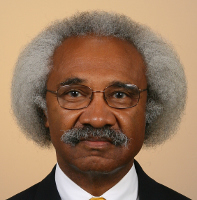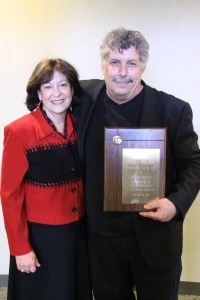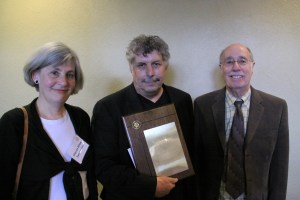–Introduced by Sharyl Kato on November 20; photos by Mike Engelberger

(Pictured above from left: Sharyl Kato, Mercile Lee & Club President Renee Moe)
When I called Mercile on the phone to notify her she was chosen as the recipient of the Swarsensky Humanitarian Award, there was a long silence. Then she said “What? I think I need time to let this sink in, I don’t know how to respond! And who else will be receiving an award at the Rotary luncheon?” she asked. I told her no one else, you are the only recipient. “Oh my, I am not feeling deserving of the award, nor am I comfortable with the attention.” She stated, “We do the work we do not because of the public recognition we receive, but because of personal commitment. It isn’t about me. It is about focusing on opportunities to help others develop to their fullest.” Service Above Self…all the more reason she is so worthy of this recognition.
Mercile, born and raised in a rural town in the state of Virginia, and the 5th child of 12 children, describes her parents as the major influence in building her character. In hearing her wonderful stories about growing up, I understand better, why, although small and quiet, Mercile is such a mighty, grounded, powerful leader.
Her wise and loving parents saw education as the key to opening doors to a better life than they had. In her early school days, for example, the school bus only picked up white students. So her father had to take her and her siblings to school, or he had to pay teachers to drive them. But after a while, her father decided to buy his own bus, fix it up and take his children and pick up other children of color, to go to school. Rather than have to wait and walk to bus stops, like the majority of students had to do, Mercile and her siblings and other students, had door to door service.

(Pictured above from left: Jim Taylor, Mercile Lee & Nancy Young)
Mercile also described a time in college when her student friends did not believe her when she said she had 11 siblings. They believed she was an only child because of how secure, composed, confident and well-dressed she was. Her friends finally asked Mercile’s mom directly and her mother said “Oh no, Mercile is not an only child. I have 12 children, but each of my children is an only child.” Her parents knew each of her siblings as individuals and gave them the nurturing attention all children need, to feel special, unique and to thrive.
Growing up in the midst of intense segregation, her parents prepared their children to cope with the realities they would be confronted with in their lives. Mercile recalls how important her parents stressed having a strong sense of self, excellence in scholarship, leadership and service for others no matter how little you had to share… to not let others define who you are….to ignore mean, untrue, destructive experiences, and in her father’s words, treat the negatives just “….like water, off a duck’s back” and stay focused. Her parents believed in self-sufficiency as she and her siblings worked very hard alongside the hired help on their farm, and they learned how to help one another be successful throughout their lives.



(Pictured above: Photo 1: Dawn Crim with Mercile Lee; Photo 2: Sharyl Kato hugs Mercile Lee; Photo 3: Mercile Lee with award placque)
Mercile attended Virginia Union University where Dr. Martin Luther King was visiting. She was selected to be his guide on campus and a continued relationship developed over the years influencing her future work. She then received her MA degree from Hartford Seminary Foundation and was first in her family to attend graduate school. She was the first faculty member of color at Ottawa University and served as Assistant Professor of Psychology and Counseling. She then became Associate Professor and Chair of the Division of Education and Psychology and now is a Life Member of the Board of Trustees. Mercile came to UW-Madison and became Assistant Vice Chancellor for Academic Affairs where she founded and directed the Chancellors and Powers-Knapp Scholarship Programs, beginning in 1984 which attracted under-represented and culturally disadvantaged students to UW-Madison. Mercile also organized University Pals, now referred to as Badger Pals, a student organization to match students with children through Big Brothers/Big Sisters.
In May of 2013, Mercile celebrated her retirement with over 500 guests attending. She made an enormous impact for student scholars and the greater community that is immeasurable for generations to come. Over 250 of her former scholars came back to campus to thank her for her efforts and so many referred to her as “their mother.” Her philosophy and approach to student development lives on beginning her first year with six scholars and now seeing 120 new Chancellors and Powers-Knapp Scholars returning this fall. Overall, a total of 1,394 supported students have graduated with 548 continuing on into graduate school. The graduation rate for Chancellor scholars is more than 80%, slightly higher than the overall campus population. Now professionals, these past UW scholars live all across the country in major cities and have themselves formed alumni clubs to continue to raise funds to support future students, including Washington, DC; Los Angeles, Chicago, San Francisco, Milwaukee and the Twin Cities.

(Pictured above from left: Mercile Lee & Club President Renee Moe)
The Swarsensky Award selection committee members were careful in distinguishing a nominee’s professional accomplishments from their volunteer services. It is noted however, that the “above and beyond” accomplishments Mercile achieved within her professional position qualified as volunteer work. As one of her colleagues states, “It took back-breaking leadership, comprehensive knowledge of the University’s capacity and incredible caring and nurturing of students outside normal work hours.” However, that was still not enough for Mercile.
Her volunteer work extends to serving on the Madison Urban League Board and committees for over 30 years. In fact, she was honored with the Urban League to receive the Whitney M. Young, Jr. Award just this month. She has volunteered as Board member and working committees for the Red Cross, Wisconsin Public TV, Big Brothers/Big Sisters, TEMPO women’s network, Housing Ministries of American Baptists in Wisconsin and founding member of the Martin Luther King Jr. Coalition which has been expanded to a weekend of programs focused on youth and adult recognition of academic achievement and building bridges in the community to establish solutions to poverty, racism and injustice.
We are often faced with overwhelming injustices and inequities on economic, educational, racial and social levels. We are all challenged to direct our feelings of sadness, disbelief, outrage and hopelessness into constructive actions and solutions. I thank leaders such as Martin Luther King Jr., Gandhi, Rabbi Swarsensky and Dr. Gene Farley who help us see that greater, longer lasting progress can be made to make meaningful changes by living our own personal lives with humanity. The means by which we achieve justice is as important as the goals we are seeking. Mercile Lee has been consistent in practicing this philosophy. She shows us as a doer. Positive change day by day made with integrity, respect, kindness, wisdom, courage and determination, child by child, student by student, adult by adult, result in long lasting powerful change. Mercile and other great leaders know that creating change by violence, self-doubt, cruelty, deception & fear only ensures we perpetuate mirroring our oppressors and losing our own humanity. Mercile cautions us not to dwell on barriers to solutions, as young people hear it and it reinforces hopelessness. “If we feel we are second class citizens then that will be the way we will function.” “Prejudice and discrimination are universal characteristics.” True understanding of our selves and one another is liberating. We cannot be defeated, or intimidated and we cannot rise above others at the expense of others.”



Please join me in celebrating Mercile and her many achievements and thanking her for her tenacity, grace and dedication to ensure a better future for all recognizing her and her work with the Rabbi Manfred Swarsensky Humanitarian Service Award for 2013.
Along with this award, a $2,500 grant is presented by the Madison Rotary Foundation to an agency of the recipient’s choice, and Mercile Lee selected the UW-Madison Chancellor’s Scholarship Program to receive the grant.

(Pictured above are Manfred Swarsensky’s daughter Sharon Swarsensky Bilow with her husband Paul Bilow)
The Manfred E. Swarsensky Humanitarian Service Award was established in 1982 and identifies individuals who have, through their voluntary efforts, made a particularly outstanding contribution to the humanitarian service in the greater Madison community, in the tradition so well exemplified by the life of Rabbi Swarsensky. The award-winning documentary video, “A Portrait: Rabbi Manfred Swarsensky,” that was created and produced by Rotarian Dick Goldberg with assistance by Wisconsin Public Television, provides background on Manfred Swarsensky and can be viewed on YouTube, and the Rotary office also has a copy of the video for any member wishing to view it.


 Today we honor the memory of Rabbi Manfred E. Swarsensky, a beloved member of our Club until his death in 1981. He was admired as a leader for inter-faith dialogue, religious tolerance, and civil rights. Before coming to Madison he had a brilliant career as a Rabbi in Berlin where he was famous for his sermons, until the Nazis burned down his synagogue and sent him to a concentration camp. Many of his family members and friends were victims of the Holocaust. He was released. At 39 years old and alone, he came to Madison and founded Temple Beth El. We, as well as the Madison community, came to admire him and respect him for his dedicated leadership to peacemaking and forgiveness, for building bridges and reconciliation. Each year we designate an award to someone who emanates the Rabbi’s ideals.
Today we honor the memory of Rabbi Manfred E. Swarsensky, a beloved member of our Club until his death in 1981. He was admired as a leader for inter-faith dialogue, religious tolerance, and civil rights. Before coming to Madison he had a brilliant career as a Rabbi in Berlin where he was famous for his sermons, until the Nazis burned down his synagogue and sent him to a concentration camp. Many of his family members and friends were victims of the Holocaust. He was released. At 39 years old and alone, he came to Madison and founded Temple Beth El. We, as well as the Madison community, came to admire him and respect him for his dedicated leadership to peacemaking and forgiveness, for building bridges and reconciliation. Each year we designate an award to someone who emanates the Rabbi’s ideals. 















